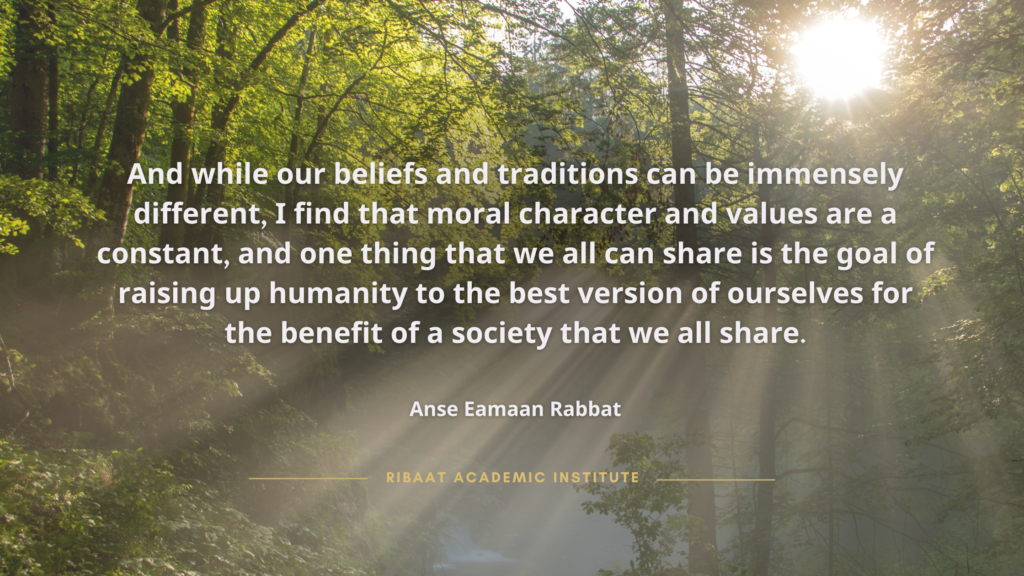Every year, the Institute for Islamic, Christian, and Jewish Studies hosts an in-person, intensive interreligious course for students who are working towards becoming faith leaders in their respective faith traditions. This year, the dialogue included students from 12 Muslim, Christian, and Jewish seminaries and universities, all working towards becoming scholars and leaders, and took place at the Pearlstone Retreat Center in Maryland. It was a varied collection of individuals ranging in age from the late teens to the late 50s, some who are already leaders in their spaces and others who are just starting out on a path of knowledge.
At the Ribaat Academic Institute, this opportunity has been offered for 3 consecutive years to 2 students each year who are working on a certification track, with the goal of opening this door of dialogue and providing an opportunity to experience the interfaith world. Attendees from Ribaat this year included myself as a visiting faculty member and two students, Soraya Ahyaudin and Shannen Espelien. It is always a pleasure to experience the mingling of minds that takes place as students strive to put their beliefs into words and seek out similarities and differences across the Abrahamic faiths.
Hosting such an experience is a bold endeavor in the light of world events that make these conversations complex and controversial, but essential in the world we live in. Courage is one of the institutional values that we hold here at Rabata, and I appreciate the staff of ICJS immensely for creating this space for upcoming teachers and leaders despite the inherent difficulties. As many of our predecessors experienced across the globe and across the centuries, people of varied religions and faiths – and those who do not adhere to any at all – are coexisting, living and working together in a shared community, on a shared land. Unique, I think, to our current space in time and place, is that silence appears to be the preferred mode of operation when it comes to our faith at best, and conflict at worst. Extremism, nationalism, Islamophobia, antisemitism, and other forms of prejudice tint our society and our interactions with each other, with little happening in terms of conversation and understanding.
And yet, our children are growing up together, often sharing classrooms, clubs, and teams. And yet, a new world is being born with advancing technology and instantaneous communication and access to information now possible more and more every day. And yet, policies, both nationally and globally, are being set that will deeply effect one and all. The question arises, is coexisting enough? To shelter ourselves and our communities from hate and discrimination, the immediate reaction tends to be closing ourselves off. Here in America, religion and faith are parts of our values that we tend to relegate to the private sphere, at the masjid or church or synagogue, and within our own homes. And while the older generations may not be quite ready to join hands, I expect in the coming years we will see a rise in interfaith marriages, organizations, and collaborations.
Among the dozens of students – Muslims, Christian, and Jewish – with whom I have interacted with over the course of these 3 years, I found that some students truly enjoy the dialogue and hope to continue in interfaith work as part of their careers. Others, while appreciating the experience, prefer to make the decision to focus on their own communities and congregations. This is a decision we will all need to make whether on a professional, personal or spiritual basis. Questions arise on a daily basis that we find ourselves and our communities facing. How deeply am I going to dive into dialogue, collaboration, or cooperation with people of other faiths? How publicly am I going to practice my faith? Will I take the path of calling others to my faith? Some see it is an obligation to invite others into their faith, with Christians and Muslims being more likely to have this view. As they feel that they have found the true Creator and the path to eternal salvation, they also feel they want to and must share this knowledge with others who may be seeking. Others prefer to avoid proselytizing, leaving to each their own, and respecting their choices and beliefs. Still others find it downright disrespectful to attempt turning believers away from their faith. With the best of intentions, we walk a fine line between understanding and offending in every opportunity for interfaith discourse.
Personally, I love to talk about my religion, beliefs, and practice wherever I find myself, whether at the gym or the grocery store, without any further aim than human connection. I find that people are generally interested in learning more about Islam, and I love to respond to the natural curiosity that I know must be brewing as I make my way from Minnesota to Virginia to Dubai and beyond as a very conspicuously Muslim woman. I don’t mind quizzical looks as I stand to pray in odd places, or wash my hands, face and feet in public sinks to prepare myself for prayer. I would love to sit with every Christian, Jew, and Hindu I come into contact with and dive into the intricacies of their faith, and learn about their own purification and prayer rituals. When I have the opportunity to do so, I find that we have much in common, and I find that what separates us is incredibly intriguing. And while our beliefs and traditions can be immensely different, I find that moral character and values are a constant, and one thing that we all can share is the goal of raising up humanity to the best version of ourselves for the benefit of a society that we all share.
Eamaan Rabbat
Education Director
Rabata



